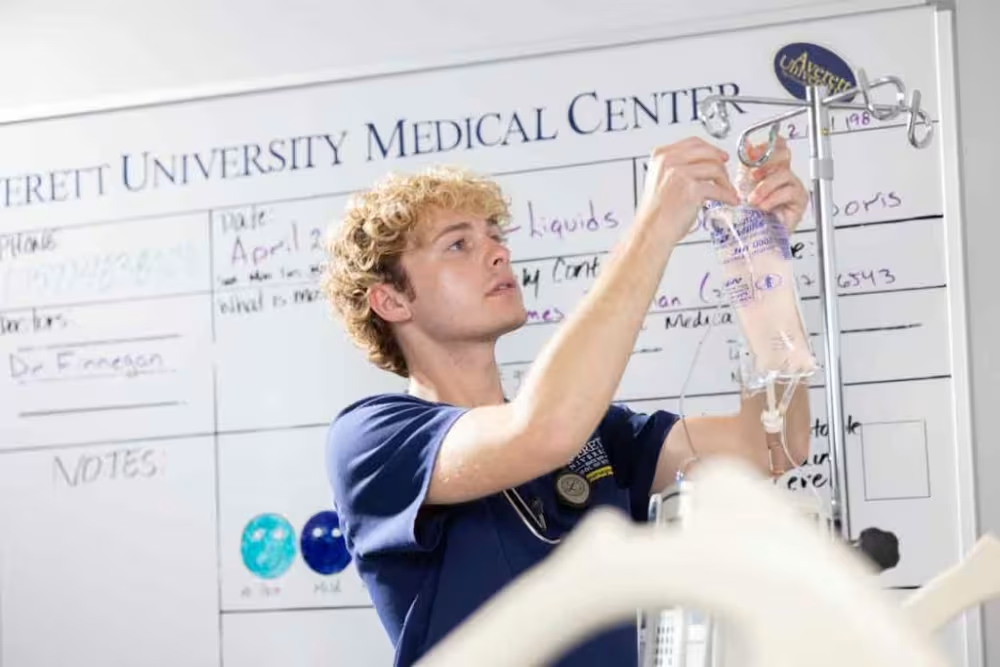How to Become a CRNA: A Guide to Becoming a Nurse Anesthetist
Each blog post is dated and contains accurate information as of that date. Certain information may have changed since the blog post publication date. If you would like to confirm the current accuracy of blog information, please visit our ABSN overview page or contact admissions at (866) 483-8705.
How do you become a CRNA? A CRNA is a certified registered nurse anesthetist. The process of becoming a CRNA starts with a bachelor’s degree in nursing. Then, you’ll need to gain clinical experience, earn a master’s degree, and earn a doctorate before passing the board certification exam.

In 1846, a patient with a tumor on his neck became the first to receive anesthesia. Since that operation, which used sulfuric ether, the science of anesthetics has evolved considerably, making it now safer than ever for patients to be anesthetized.
Often, patients’ health and welfare rest in the hands of a certified registered nurse anesthetist (CRNA). If you’re interested in learning how to become a CRNA, your journey could begin with a Bachelor of Science in Nursing (BSN) from Averett University.
Averett’s Accelerated BSN (ABSN) program leverages your prior non-nursing education, so you can earn a BSN in as few as 16 months. From there, you can continue on to become an advanced clinician who specializes in anesthetics.
How do you become a CRNA? While you’re planning your career pathway, you’ll first want to learn more about what a CRNA is, what they do, and how long it takes to become a nurse anesthetist. Then, consider the process of how to become a nurse anesthetist.
What Is a CRNA?
A certified registered nurse anesthetist is a type of advanced practice registered nurse (APRN). APRNs are at the highest level of nursing. They have the advanced education, training, and certification necessary to practice with greater autonomy and serve as nurse leaders.
This advanced training is vital for CRNAs, considering that nurse anesthetists play a major role in whether a patient survives surgery. CRNAs are responsible for administering anesthetics and pain medications to patients during surgeries and other procedures. Some types of anesthesia they administer render a patient unconscious, while others numb parts of the body but leave the person conscious.

What Does a Nurse Anesthetist Do?
Patient safety is a top concern for nurse anesthetists. Before administering any medications, the CRNA needs to review the patient’s medical history and ask questions about their allergies, prior surgical history, and any reactions to anesthesia. The CRNA then calculates the proper dosages of medications and administers them in the operating room.
Nurse anesthetists continually monitor patients while they are under the effects of anesthesia. If the patient shows signs of complications, they might need to perform interventions. After the procedure, the CRNA will monitor the patient as they recover from the effects of the medications.
How Long Does It Take to Become a CRNA?
As you take a closer look at how to become a CRNA, you might be curious how long it can take you. There is no single universal answer to this question, as people come to the nursing field in different ways.
If you have no prior college education, it will typically take four years to earn a BSN. Then, you’ll need at least a few years of clinical experience before you can earn a master’s degree and then a doctorate.
A master’s degree might take two to four years, whereas a doctorate might take three to five years, both of which depend on whether you’re a part-time or full-time student. Alternatively, you could enroll in a BSN to doctorate program if one is available in your area. Then, you’ll need to earn board certification to become an APRN. It can take eight to 15 years to become a CRNA.
On the other hand, if you enroll in Averett’s ABSN program, you could earn a BSN in as few as 16 months, shortening the time it takes to become a CRNA.

Thinking of becoming a nurse at 40? Discover how to make a midlife career change to nursing.
How to Become a Nurse Anesthetist
The pathway toward becoming any type of APRN starts with earning a bachelor’s degree in nursing.
Earn a BSN
Averett’s ABSN program doesn’t require prior healthcare experience, although you may need to complete some prerequisites before applying. These courses prepare you for the nursing curriculum, which covers everything from health assessments and disease management to mental health and beyond.
Averett’s comprehensive nursing curriculum focuses entirely on nursing education, eliminating the general education requirements that are found in traditional BSN programs. You’ll take a combination of didactic classes, which can be completed online, and in-person learning components at Averett’s Norfolk learning site.
The on-site learning components include nursing skills labs, where you’ll learn how to perform essential nursing tasks like nasogastric tube insertion. You’ll also complete nursing simulation labs, which teach you how to apply the nursing process to various patient care situations. During clinical rotations, you’ll gain hands-on experience working with patients at local healthcare facilities.
Keep in mind that you will eventually need to pursue graduate-level nursing education; you cannot become a CRNA with only a bachelor’s degree. The Averett ABSN program, however, is a crucial first step in your journey toward becoming a nurse anesthetist.

Obtain a Nursing License
Graduating with a BSN qualifies you to take the NCLEX-RN, the national nursing licensure exam that all prospective registered nurses (RNs) must pass.
The NCLEX is a computerized and adaptive test, meaning that the test adapts to your performance. When you answer a question correctly, the next question will be a little more challenging. If you answer a question incorrectly, the next question will be a little easier.
In addition to knowledge of nursing concepts, you’ll need strong critical thinking skills to pass the NCLEX. The test evaluates your ability to develop appropriate nursing responses to clinical situations. This means that there may be more than one correct answer, but only one answer will be the most appropriate given the context.
A passing score on the NCLEX allows you to obtain a nursing license issued by the state.
Gain Clinical Experience
After obtaining a nursing license, you can work as an RN. Look for jobs in nursing specialties that are related to the CRNA career. These can include:
- Critical care
- Surgical nursing
- Plastic surgery
- Transplant nursing
For best results, treat the first few years of your clinical career as an extension of nursing school. Take every opportunity to expand your nursing knowledge and learn from the more experienced nurses you work with. Once you’ve gained some clinical experience, you may feel ready to further your nursing studies.
There are lots of alternative nursing career options to consider.

Earn Your Graduate Degrees
After gaining clinical experience, you can earn a Master of Science in Nursing (MSN). Then, you can apply to a Doctor of Nursing Practice (DNP) or a Doctor of Nursing Anesthesia Practice (DNAP). The DNP is more research-focused, whereas the DNAP is a professional degree that focuses on applying research to the field. Note that some schools offer a BSN to DNP program, which combines the MSN and the DNP.
Obtain Board Certification and APRN Licensure
After earning a DNP or DNAP, you can take the board certification exam for future certified registered nurse anesthetists. You’ll take the National Certification Examination (NCE) administered by the National Board of Certification and Recertification for Nurse Anesthetists (NBCRNA).
Once you pass the board certification exam, you can obtain state licensure as a CRNA. You’ll need to maintain your certification through the Continued Professional Certification (CPC) program, which is also administered by the NBCRNA.

Another option is to become a nurse practitioner, another type of APRN. Learn how to become an NP.
Pursue Your Future in Nursing at Averett University
At Averett, you can earn a BSN in as few as 16 months, which can considerably accelerate your pathway toward becoming a nurse anesthetist. If you have a non-nursing bachelor’s degree or at least 60 non-nursing college credits, you may be eligible to apply.
Here, you’ll receive personalized attention thanks to our small class sizes, dedicated nursing instructors, and Academic Success Coaches. Contact our admissions advisors today to get started.
